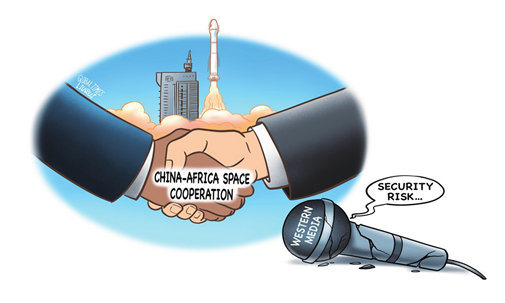In recent years, cooperation between China and Africa in the space field has deepened. However, some Western media outlets have tried to distort the nature of this cooperation. On Tuesday, Reuters reported that China is “building space alliances in Africa to enhance its global surveillance network and advance its bid to become the world’s dominant space power.” The article also cited remarks from the Pentagon, claiming that China’s space projects in Africa and other parts of the developing world are a “security risk.”
The real security risk is not cooperation or the sharing of technology, but the ideological prejudice of the West that clings to hegemony and obstructs progress. For a long time, space and other high-tech fields have been dominated by the US and its allies. Behind the smear campaigns of Western media lies the West’s fear of China-Africa cooperation.
The cooperation between China and Egypt in space technology, referred to by foreign media as “China’s secretive overseas space program,” has been open and transparent. Public records show that Egypt is the first country to carry out satellite cooperation with China under the framework of the Belt and Road Initiative. At the end of 2023, the jointly designed and developed satellite MISRSAT-2 was successfully send into orbit. An Egyptian Space Agency official said that the project has promoted the training of Egyptian space professionals, helping Egypt become a leader in the field of space satellites in Africa and the Middle East. This “teach a man to fish” approach is a key step for Africa to achieve autonomous industrialization and modernization.
Western media’s smear campaign against China-Africa space cooperation ignores the legitimate need for African countries to develop space technology. Space technology and monitoring systems can be used for weather monitoring, agricultural planning, environmental protection, and disaster management, helping Africa address climate change, improve agricultural productivity, optimize resource management, and enhance national emergency response capabilities.
More broadly, China-Africa space cooperation reflects the changing global technological cooperation landscape and the reshaping of development rights. In the past, developing countries often had to rely on Western countries for technological aid, which came with many restrictions. However, through the concept of South-South cooperation, China has provided a more equal and sustainable cooperation model, helping African countries achieve self-development in critical fields such as space technology. This not only enhances Africa’s position in the global technology system, encouraging developing countries to participate in global technology governance, but also contributes to advancing the global multipolarization process.
“Space is not a club for the rich,” said Song Zhongping, a Chinese military expert. Through win-win cooperation with Africa, China is helping more developing countries to quickly enter the mainstream of global technological development, embodying the democratization and multipolarization trend of modern technology, he noted.
The focus of African and Global South countries is on more practical and sustainable development needs, rather than geopolitical games. The US and Western countries must choose the right path – abandoning the mind-set of technological hegemony, adopting a more open and inclusive approach, and actively participating in the global technological cooperation process.
From infrastructure construction to focusing on modernization and cutting-edge technology, the “sour grapes” narrative of foreign media cannot conceal the fruitful outcomes of China-Africa cooperation. While the West is busy weaving lies, China and Africa have already woven a network of development and illuminated an autonomous future with technology, writing a new chapter of unity and development for the Global South.











